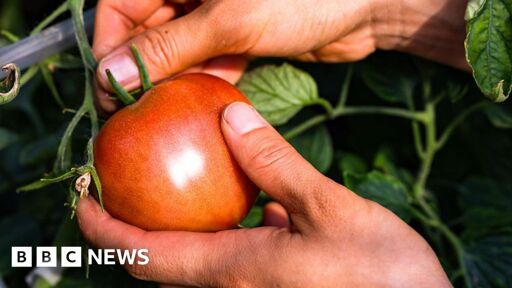- cross-posted to:
- [email protected]
- [email protected]
- cross-posted to:
- [email protected]
- [email protected]
Summary
An investigation revealed that “Italian” tomato purees sold in UK and German supermarkets likely contain tomatoes grown in China’s Xinjiang province, linked to forced labor involving Uyghur and other minorities.
Testing found 17 products, many from Italian supplier Petti, containing Chinese tomatoes despite labels suggesting Italian origins.
Supermarkets disputed the findings, though some, like Lidl, admitted past use of Chinese tomatoes.
The EU is strengthening laws to address forced labor in supply chains, while critics warn the UK’s weaker regulations risk making it a “dumping ground” for such products.
If you want the best concentrated tomatoes you need the best concentration camp.
It’s easier to point out what didn’t involve slave labor at this point.
You can really taste the slavery
Even with free labor I can’t see how it’s cost effective once you consider the price of shipping a cheap and perishable good like a tomato
In Sicily many tomatoes are picked by immigrants paid 200 euro per week (70 hours weeks), that’s almost slavery; because it’s cheaper to transport the wholesale price paid by the factory located in Europe should be similar to tomatoes grew by slaves in a desert 3000 km far from the nearest port. Unless the purees factories are located there.
Edit: I investigated more on the issue and learned that it was concentrated puree that was imported, with long shelf life, and that the company already had issue some years ago with the Italian food inspectors which seized many stuff, and then was photo evidence of Chinese concentrate barrels in that Italian factory
I’d almost guarantee it is some kind of concentrate/dehydrate or pasteurized input puree that is more stable, ans not raw tomatoes. If it even happened that is.
It would be even cheaper to transport concentrated/dehydrated immigrants. I’m sure someone is working on it.
What the Trisolarans are worried we’ll do to them. For mostly fair reasons.
It’s really no different in the tomato-loving U.S.
It’s picked by migrant workers, mostly from Latin America, who get treated like shit and send the tiny amount of pay they get home, so they’re pretty much entirely beholden to the farm (which is a huge corporation) to feed and house them. They also will get deported if they leave the farm and are noticed by law enforcement.
They’re not literally slaves, but it’s damn near close.
Note the camp here is called “better than some.”
In Canada, we have codified and legally endorsed all that. Employers have an absurd amount of power over “migrant workers”. Abuse is baked right into the system.
China grows about a third of the world’s tomatoes.
I don’t know why you would cast doubt on this when we know China grows way more tomatoes than they can use, uses slaves, and those tomatoes are going SOMEWHERE. But that’s not convincing because you are not certain about some of the horticultural details?? Like, it really sounds like you are looking for a reason not to believe the truth being thrust in your face.
that’s probably what happens. Tomatoes get at least half-processed in China, so they are less perishable and cheaper to transport and then mixed with that 1% of “true italian” tomato puree and bottled/canned somewhere in Italy so the result can be marketed as an italian product.
This is not specific to tomatoes. I remember an article doing the math for Chianti and questioning how millions of liters of wine can all come from grapes grown on a few hills in a small part of Tuscany.
They last for weeks when picked green and artificially ripened at the destination.
Oh, what the everliving fuck?!
EU pls
I grow my own tomatoes when in season or buy at the farmers market
Oh hell no
deleted by creator
Thank you for addressing one percent of global tomato concerns. The rest of the 99% are so grateful you’ve overlooked the shitty practices of the industry.
You’re a hero!
/s
It’s better than 0%
Oh, so all of the bullshit is OK because it’s not 100% bullshit just 99% bullshit?
It has to get better somehow. Yes it’s horrible. Absolutely. But you have to start somewhere.
Prove it then. Otherwise, you’re splitting hairs over one percent, and that hardly excuses the other 99%.
Clearly, all the fraud and corruption doesn’t bother you unless it’s 100% rather than 99%. What is anyone to think of your judgment?
What are you asking for?













